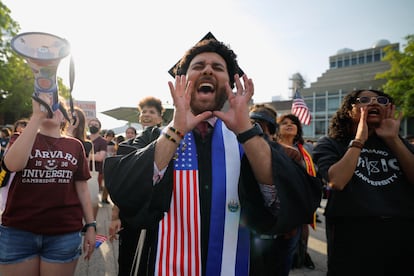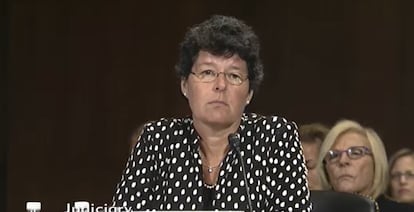Allison Burroughs, the judge targeted by Trump who has Harvard’s future in her hands
The magistrate who ordered the precautionary suspension of the ban on foreign students had already ruled in favor of the university in 2019 in a case on positive discrimination in the admissions system


The latest star in the cast of federal judges turned protagonists of the movie about Donald Trump’s second administration is Allison D. Burroughs, a magistrate serving on the District Court of Massachusetts in Boston. Appointed during Barack Obama’s presidency, a fact that suggests she has a certain Democratic affiliation, she was the judge who last Friday issued a temporary suspension of the White House’s decision to prohibit Harvard University from continuing its foreign student and research exchange program.
The Trump administration’s order arrived last Thursday by letter. Signed by Kristi Noem, the Department of Homeland Security (DHS) secretary wrote: “This administration is holding Harvard accountable for fostering violence, antisemitism, and coordinating with the Chinese Communist Party on its campus.” Noem added that, “effective immediately,” some 6,800 of those international students (27% of Harvard’s total) would lose their visas and were left with two options: find another university, or face deportation.
Harvard sued the government on Friday for what it called an “act of retaliation,” and within hours, Burroughs ordered the measure suspended, arguing that implementing it would cause “immediate and irreparable harm” to the university.
Burroughs is a veteran of Harvard law. In 2019, five years after her appointment, she sided with the university in a case in which the plaintiffs, a group called Students for Fair Admissions, challenged the university’s affirmative action in evaluating applicants for admission, arguing that it violated Title VI of the Civil Rights Act of 1964. The policy, the plaintiffs argued, severely disadvantaged Asian students, an ethnic group within which applicant competition is higher than among non-Asian students.
Burroughs, who applied to Harvard as a young woman and was rejected, sided with the prestigious university because she understood that the institution acted without “discriminatory intent” or “conscious bias.”

The First Circuit Court of Appeals, which has jurisdiction over the Northeastern United States and Puerto Rico, upheld the lower court’s decision the following year. The plaintiffs successfully persuaded the Supreme Court to hear the case in 2021. In a decision of six votes (the six conservative justices) to two (the progressive justices Elena Kagan and Sonia Sotomayor), the Supreme Court ended 40 years of affirmative action at American universities. The high court’s only Black female justice, the newly appointed Ketanji Brown Jackson, did not vote in that case; Jackson recused herself due to her ties to Harvard at the time.
Judge Burroughs also reviewed a lawsuit filed by Harvard and the Massachusetts Institute of Technology (MIT), against the first Trump administration. At the beginning of the pandemic in 2020, U.S. Immigration and Customs Enforcement (ICE) ordered international students enrolled online to leave the country. In that case, Burroughs didn’t have time to issue a ruling because ICE withdrew its efforts, and those students were able to continue their studies remotely in the United States.
Demand to freeze $2.2 billion
The judge is also considering the other ongoing lawsuit between Harvard and Trump. In April, the university sued the government for the freezing of $2.2 billion in federal funds after it refused to accept policy changes demanded by the White House. A few weeks later, another $450 million was cut, and the president threatened to revoke Harvard’s tax-exempt status.
Last Monday, in a post on his social media platform, Truth, in which the U.S. president has been airing his outstanding scores with Harvard, he wrote that federal officials were still waiting for academic authorities to provide them with “lists of foreign students at Harvard” who they suspect of participating in illegal activities during last year’s pro-Palestinian protests.
“We are still waiting for the Foreign Student Lists from Harvard so that we can determine, after a ridiculous expenditure of BILLIONS OF DOLLARS, how many radicalized lunatics, troublemakers all, should not be let back into our Country. Harvard is very slow in the presentation of these documents, and probably for good reason! The best thing Harvard has going for it is that they have shopped around and found the absolute best Judge (for them!) — But have no fear, the Government will, in the end, WIN!” Trump wrote in his usual convoluted syntax.
Harvard President Alan Garber gave an interview Tuesday to NPR, another institution targeted by Trump. “The money that goes to research universities in the form of grants and contracts, which is almost all of the federal support that we get, is used to pay for work that we perform at the behest of the government,” Garber said. “Reallocating to some other use,” as Trump proposed Monday, when he threatened $3 billion more in cuts, to give that money to “trade schools,” means, for Garber, “that work [for which Washington has already paid] just won’t be performed.”
The Trump administration announced shortly after the interview aired that federal agencies would cut all current contracts with Harvard. The financial hit amounts to approximately $100 million. Both sides then appeared in court before Burroughs. The judge summoned them again for this Thursday. Then, a fight that has shaken the American academic world could end up in the Supreme Court, dominated by a conservative majority of six justices, unprecedented since the 1930s. Three of them were appointed by Trump during his first term.
Sign up for our weekly newsletter to get more English-language news coverage from EL PAÍS USA Edition
Tu suscripción se está usando en otro dispositivo
¿Quieres añadir otro usuario a tu suscripción?
Si continúas leyendo en este dispositivo, no se podrá leer en el otro.
FlechaTu suscripción se está usando en otro dispositivo y solo puedes acceder a EL PAÍS desde un dispositivo a la vez.
Si quieres compartir tu cuenta, cambia tu suscripción a la modalidad Premium, así podrás añadir otro usuario. Cada uno accederá con su propia cuenta de email, lo que os permitirá personalizar vuestra experiencia en EL PAÍS.
¿Tienes una suscripción de empresa? Accede aquí para contratar más cuentas.
En el caso de no saber quién está usando tu cuenta, te recomendamos cambiar tu contraseña aquí.
Si decides continuar compartiendo tu cuenta, este mensaje se mostrará en tu dispositivo y en el de la otra persona que está usando tu cuenta de forma indefinida, afectando a tu experiencia de lectura. Puedes consultar aquí los términos y condiciones de la suscripción digital.








































